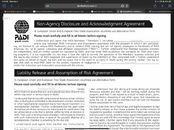In
one of your more recent attacks, you cited the case of Tareq Saade, and you use his 2012 fatality to attack the shop through which he was being trained. For some reason you were unable to find the
ScubaBoard thread about the incident.
Scubaboard didn't pop up.
If you review it in its entirety, you will see that several people did all they could to blame the instructor for the death, but in the end the people who recovered the body, including the highly reputable Lamont (then the moderator of the DIR forum on ScubaBoard), concluded that absolutely nothing was done wrong.
Would you care to post which comment numbers actually state what you claim? As I'm not seeing it after 2 passes. I did skip over some of the nonrelevant discussion and I didn't see that. People have tendency to interpret things to support their agenda, so I figured I'd ask in case I am guilty of that in my readings of that thread.
The dive had gone according to plan, and everything was within standards. The class was routinely headed back to shore. The student, a reasonably experienced diver taking an AOW class, suddenly and without warning bolted to the surface and died.
Well, isn't an instructor supposed to maintain control, position themselves to ensure control, etc.? Now mind you, I think this is an impossible thing to guarantee. That thread doesn't have all the information necessary to say how the system could be changed. You think I'm in this crusade against PADI, but I'm not. I'm all for agencies lowering ratios, lack of practical guidelines on a number of important topics. I'm really big on proper weighting, and I think most agencies do a really poor job at this.
In fact, there is an agency, not PADI, that if they ever have a lawsuit at a dive center in which a friend of mine worked and reported some of the craziest standards violations I have heard from anyone anywhere, I will contact the plaintiff and do everything I can to make that agency burn for ignoring seriously dangerous practices. Again, not PADI.
What would you have done differently on that dive?
I can't say what I would do differently as I don't have all the information about equipment and so on. I determine proper weighting, I require (provide my own if needed) good dive lights even during the day. There's also the standard of always being in control. Now while I think this is impossible to guarantee, I do limit myself to 2 students.
I believe every instructor in every class has the potential for something like that to happen, so we with perfect safety records are all to some extent lucky not to being named as something akin to a murderer on ScubaBoard.
Oh John, I can always count on you to go over the top. "Attacks" (you mean "statements") "Akin to a murderer" (you mean :improperly trained or negligent or both") Shaking my head. And yes, with the poor training, high maximum ratios, etc.., I consider myself one of those lucky ones. I'm not out to lynch the instructor, but I think in the interest of safety, we should do everything we can to avoid future incidents. And I feel that agencies, being the ones to train instructor, bear responsibility for this.
The tragic death Tareq Saade is a data point and does merit analysis. Unfortunately, not all information is available in this or more fatalities. The point I'm making that should be obvious to the people who are not obtuse or blinded by their agency worship, is that when fatalities occur, these should be used to determine what changes may mitigate this.
To me, it is all about changing the systems.
Now for Seattle Scuba and the death of Patricia Flores-Perez, there was another shop teaching at Cove 1 that day, and I spoke to that instructor. The information i have is that there was 2:4 ratio, instructor (supposedly Tareq's instructor) signalled everyone to surface. Everyone did, but Ms. Florez-Perez. The instructor, assistant, and 3 other students were low on air and did not attempt to search for the missing students, nor did they notify anyone on shore, as the instructor from the other shop was still kitted up and could have grabbed a tank and been out on the water within 2-minutes. Would it have saved the young woman's life? Probably not. I'm not going to bury the instructor, as I can't speak to how I would handle having lost a student. I'm interested in changing the system so that students are not so easily lost. Or in the case of Yuyu Xu who died just over a year ago, not have so many divers together at night (2 instructors, 7 students. There is no way I could keep track of 8 other lights at night in for an entire dive. Not a chance). They were within standards, and I think those standards (not just PADI's) need to change.
I won't claim that there won't be fatalities ever with these changes and more being changed, but I do believe sincerely that some deaths may be avoided. And that's the important thing here. I'm not looking at the scale of an NTSB investigation/conclusion, but for there to be something meaningful.




